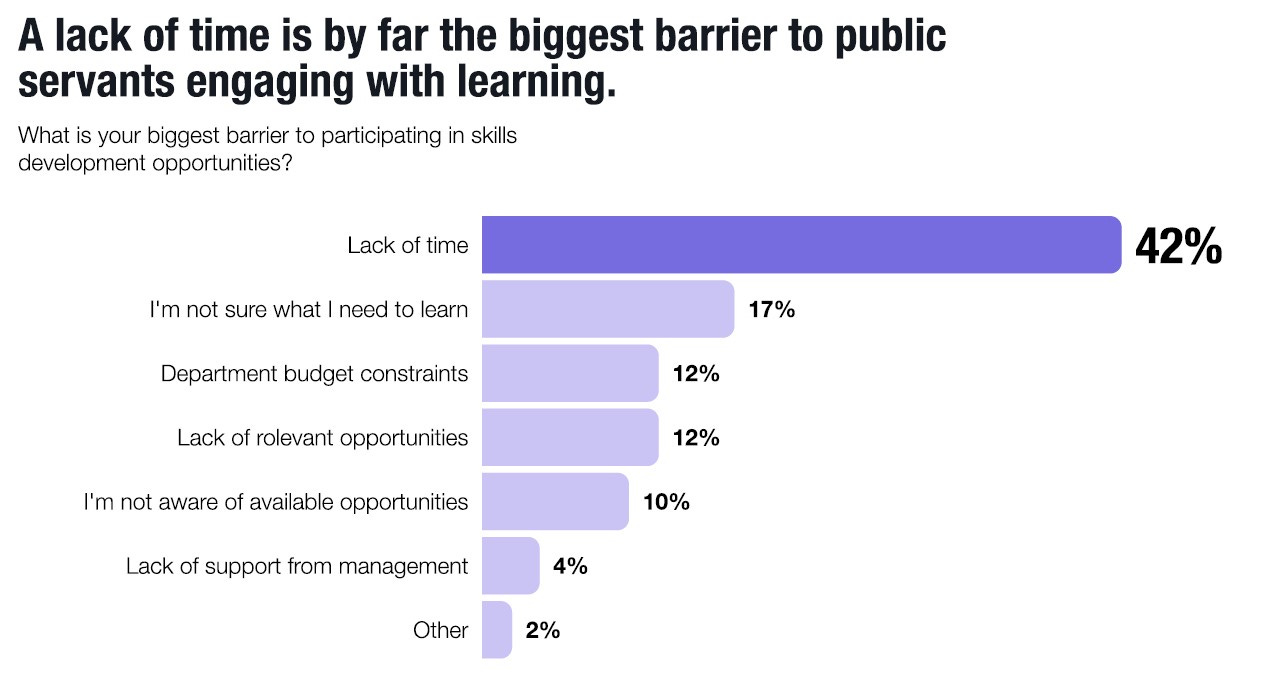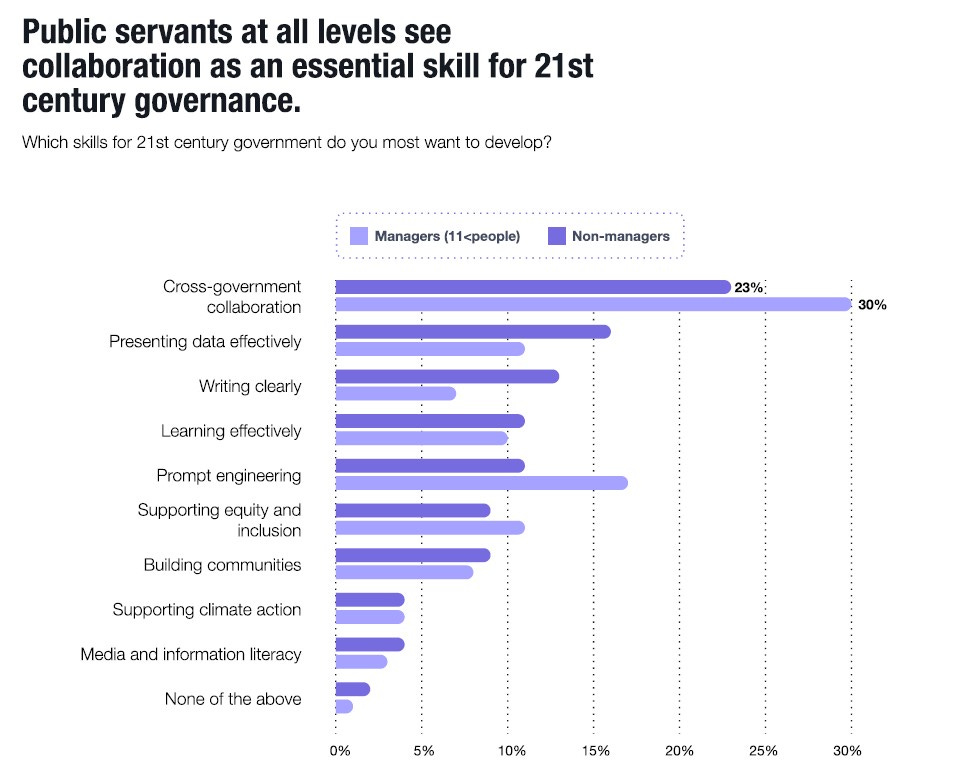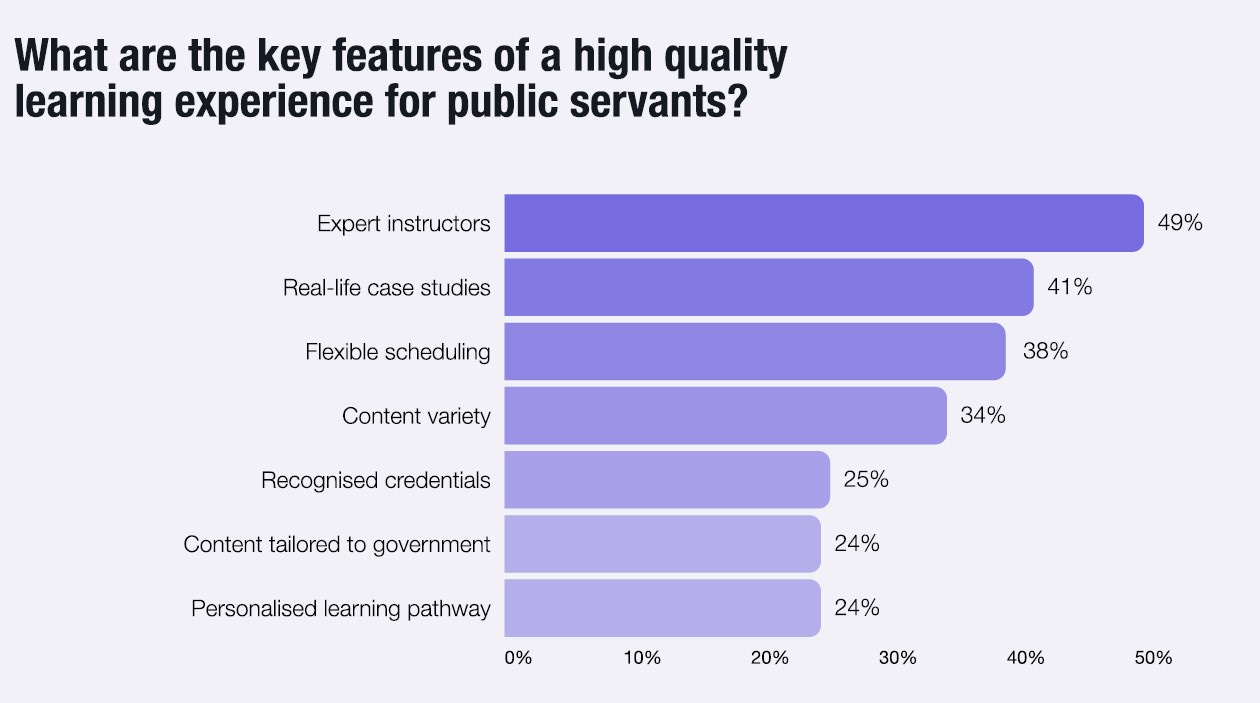Dispatch #98: Cultivating a culture of learning- The key to government effectiveness
This dispatch discusses the challenges faced by public servants and the innovative strategies necessary to bridge the skills gap & enhance state capacity for a rapidly changing world.
The importance of learning within bureaucracies worldwide cannot be overstated, particularly as it impacts state capacity. Having dedicated a significant portion of my career to building capacities and focusing on learning and development, I recognize that training bureaucrats is not just beneficial but essential. As governments around the globe face increasingly complex challenges, the need for a well-trained and adaptable public service workforce becomes critical. This dispatch explores the current state of learning in government as outlined in a recent survey conducted by Apolitical, integrating insights from Professor Geoff Mulgan's paper on the skills necessary for effective governance.
The current state of learning in government
The survey, conducted by Apolitical and involving 2,064 public servants from 66 countries, revealed that while public servants are eager to learn, systemic barriers hinder their development.
Apolitical is a pioneering platform dedicated to enhancing the effectiveness of public service worldwide. As the largest community of public servants, it connects over 250,000 professionals across 160 countries, facilitating the exchange of best practices and innovative solutions. Apolitical's mission is to build 21st-century governments that serve both people and the planet, recognizing that skilled public servants are essential for effective governance.
The findings indicate that learning is often viewed as an afterthought rather than a core function of government operations. Many public servants are overwhelmed by urgent priorities, leading to confusion about what skills they need to develop. This disconnect between the rhetoric surrounding learning and its practical implementation poses a significant challenge for governments aiming to build capacity.
Key insights from the survey
Learning time allocation: Public servants typically engage in about 9 hours of learning each month, with only 3 hours being formal training. The remaining hours consist of unstructured and informal learning activities, which often go unrecorded. This highlights a wealth of untapped knowledge within government that could be leveraged for improved outcomes.
Lack of clarity: Approximately one-third of public servants lack clarity regarding their learning needs. This uncertainty can lead to what the report describes as ‘lost learners,’ who struggle to navigate their career paths amidst rapid technological changes and evolving job requirements.
Online training dominance: With 98% of training occurring online, there is a pressing need for high-quality online learning standards. While online training offers flexibility and customization, it must be effectively designed to maximize its impact on job performance.
Supportive learning culture: There is a clear link between learning and job performance; around 70% of public servants believe that their training has positively influenced their work. However, this goodwill towards learning must be nurtured by leadership within government organizations.
Impact of technology: The rapid advancement of technology, particularly artificial intelligence (AI), necessitates continuous upskilling among public servants. Governments must prepare their workforce to adapt to these changes effectively.
Professor Geoff Mulgan's paper, Skills for running governments, provides a comprehensive overview of the skills required for effective governance in today's complex environment. Mulgan highlights a significant issue: despite having highly educated personnel, many governments struggle with low levels of public trust. This is often due to a perceived lack of competence among civil servants and politicians, leading to questions about whether those in power are learning the right skills in the right ways.
The biggest challenges in modern government training, as outlined in the paper, highlight significant gaps and areas for improvement in the development of public servants. Here are the key challenges identified:
1. Mismatch between skills and needs
Despite having highly educated personnel, many governments struggle with low levels of public trust and perceived competence. There is often a disconnect between the skills that are taught and the actual needs of public servants in addressing contemporary challenges. This misalignment can lead to ineffective governance and a failure to solve pressing societal issues.
2. Limited training for politicians
Training opportunities for elected officials are often scarce, with many politicians expected to rely solely on their instincts and experiences. In contrast, countries like China invest heavily in training their leaders through structured programs at party schools. The lack of similar support for politicians in democracies can result in a leadership that is ill-prepared to navigate complex governance issues.
3. Outdated training models
Many existing training programs are based on traditional educational models that may not adequately address the evolving landscape of governance. The emphasis on economics and law, while important, may overlook emerging competencies such as systems thinking, innovation, and engagement strategies. This outdated approach can hinder the development of adaptive and responsive public servants.
4. Insufficient integration of informal learning
Informal learning, which constitutes a significant portion of public servants' learning experiences, is often not recognized or supported within formal training frameworks. Governments need to create environments that encourage informal learning through peer collaboration, mentorship, and community practices to maximize the potential of their workforce.
5. Lack of quality standards in online learning
With a significant shift towards online training, there is a pressing need for high-quality standards to ensure that digital learning experiences are effective and engaging. The rapid expansion of online courses can lead to variability in quality, making it challenging for public servants to gain valuable skills through these platforms.
6. Resistance to change
Cultural resistance within government organizations can impede efforts to modernize training approaches. Established norms and practices may create barriers to adopting new methodologies that prioritize experiential learning, innovation, and collaboration.
7. Resource constraints
Budgetary limitations often restrict the availability of comprehensive training programs. Many governments face fiscal pressures that lead to cuts in training budgets, which can adversely affect the capacity-building efforts needed for effective governance.
8. Need for continuous learning
The fast-paced nature of global challenges—such as climate change, pandemics, and technological advancements—requires a commitment to continuous learning among public servants. However, many existing training programs do not facilitate ongoing professional development or adaptability to new information and skills.
He identifies ten rising needs that are increasingly essential for public servants:
Policy implementation: Understanding policy as an end-to-end process is crucial for effective governance. Public servants must be equipped with skills that allow them to not only formulate policies but also implement them efficiently.
Problem-solving: Robust problem-solving capabilities are necessary to address the multifaceted challenges governments face today, from economic crises to social unrest.
Science and technology: Leveraging scientific knowledge and technological advancements is vital for modern governance, especially in areas like health care and environmental policy.
Engagement and mobilization: Skills for engaging citizens effectively are essential, as governments must foster trust and collaboration with the communities they serve.
Innovation: Fostering innovative approaches within government can lead to more effective solutions and improved service delivery.
Systems thinking: Understanding complex systems and their interconnections allows public servants to approach problems holistically rather than in isolation.
Intelligence function: Utilizing data and AI effectively can enhance decision-making processes and improve governance outcomes.
Psychology: Grasping what motivates people is key to designing policies that resonate with citizens and encourage compliance.
Future orientation: Anticipating future challenges enables governments to proactively address issues before they escalate.
Global thinking: Embracing a global perspective in policymaking helps governments navigate international challenges such as climate change and migration.
Recommendations for enhancing learning
To bridge the gap between current practices and the potential for effective learning in government, several detailed recommendations emerge from both the survey and Mulgan's insights:
Institutional support for informal learning: Governments should establish formal support structures for communities of practice that facilitate high-impact informal learning across departments. By recognizing and valuing informal learning, governments can tap into millions of hours worth of unrecorded knowledge that public servants engage with monthly.
Intelligent individualized learning plans: Promoting data-driven, personalized learning plans can help public servants identify their skill gaps and navigate their professional development more effectively. This approach can address the issue of ‘lost learners’ by providing clear pathways for skill acquisition aligned with individual career goals.
Quality standards for online training: Develop new standards for online learning in government that focus on ensuring high-quality content tailored to diverse departmental needs.
Leadership engagement in learning initiatives: Encourage line managers to create conditions conducive to learning by allocating time and resources for development activities during work hours.
Investment in training budgets: Prioritize investments in training despite budget constraints, recognizing that cutting training budgets often lead to poorer outcomes in service delivery.
Emphasizing continuous learning culture: Cultivate an environment where continuous learning is integral to everyday operations, recognizing the value of both formal and informal learning opportunities.
As we navigate an era marked by rapid technological advancements and complex global challenges, fostering a culture of continuous learning within bureaucracies is paramount. By investing in the development of public servants through structured training programs and supportive environments, governments can enhance their capacity to respond effectively to emerging challenges. Ultimately, building a skilled workforce is not merely an operational necessity; it is a strategic imperative that will determine the efficacy of governance in the 21st century. Integrating insights from both Apolitical's survey and Professor Mulgan's analysis underscores the critical need for targeted skill development in our public sector workforce, ensuring they are equipped to meet the demands of modern governance effectively. By addressing these gaps in skills provision through comprehensive training initiatives, governments can rebuild trust with citizens while enhancing overall effectiveness—ultimately contributing to societal well-being and success.





